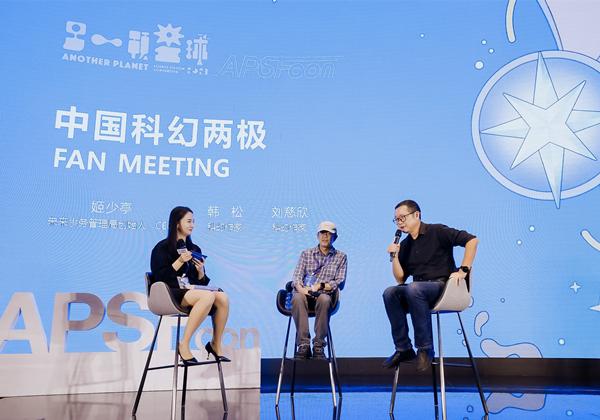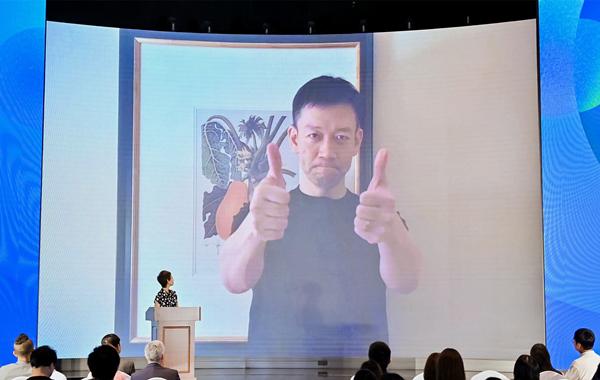Sci-fi event APSFcon discusses future and technology
- By Zhang Rui
 0 Comment(s)
0 Comment(s) Print
Print E-mail China.org.cn, October 4, 2023
E-mail China.org.cn, October 4, 2023
The Another Planet Science Fiction Convention (APSFcon), held from Sept. 23-24 in Shanghai, became a platform for discussions centering around artificial intelligence (AI) and visions for future technologies.

Ji Shaoting, the founder and CEO of the Future Affairs Administration, speaks to China's renowned sci-fi writers Han Song and Liu Cixin at an event during the Another Planet Science Fiction Convention (APSFcon) held in Shanghai, Sept. 24, 2023. [Photo courtesy of Future Affairs Administration]
Ji Shaoting, the founder and CEO of the Future Affairs Administration, a company that deals with sci-fi businesses, promotes sci-fi culture, and is the organizer of APSFcon, said that the convention has always been a gathering organized around "sci-fi enthusiasts." "Sci-fi enthusiasts are all those who care about science fiction," Ji said. "They might not be children or authors, but anyone who is concerned about the future and willing to ponder the relationship between humans and technology is a sci-fi enthusiast. They are the very people we hope to see participating in the convention."
Du Qingchun, an associate professor at the Beijing Film Academy, said at a forum held during the event that the true new language of sci-fi effectively describes the revolutions emerging within society, adding, "This is where the power of science fiction truly lies."
While AI is now a mainstay topic discussed at many sci-fi forums around the world, sci-fi writer He Xi points out that it's actually an old issue, suggesting its history might even predate that of computers. He adds that sci-fi writers don't need to jump on the bandwagon. While he personally focuses more on the progress in fundamental technologies in his writing, He noted, "By studying the operating mechanisms of the human brain and endowing machines with intelligence, AI becomes a mirror. It allows us to see things we couldn't before, which is quite fascinating."
He also posited, "Nobody enjoys mere labor; humans lean towards creation. While we often juxtapose carbon with silicon, the fusion of humans and machines will soon become the norm. In the future, we might not distinguish purely between humans and machines; we'll all be carbon-silicon entities. It's not about 'one overcoming the other.'"
Now eight years on after Liu Cixin won the Hugo Award for his "The Three-Body Problem," the sci-fi author says he has observed a notable shift in science fiction is that it has moved from China's cultural periphery to its spotlight. Yet, Liu emphasizes the genre is still in its developmental stage, citing the need for more influential authors and works. He views societal progress and tech advancement as key drivers for science fiction's evolution, believing China, with its futuristic vibe, will steer its growth.
Nevertheless, as technology intertwines with daily life, capturing the magical essence of science in writing has become a more complex challenge for sci-fi creators.
"Of course, current sci-fi literature is making many efforts, trying not to rely solely on the magic of science to attract readers," Liu said. "This includes exploring literary expression techniques, enriching its methods, and uncovering the potential of sci-fi to reflect reality. But, honestly, the outcomes of these efforts haven't been ideal," he admitted.
Liu even criticized the movie adaptation of his own book, "The Wandering Earth," during the event, urging people to think beyond humanity. "I recall a line from 'The Wandering Earth II' where a scientist, on the brink of drowning, remarks, 'A civilization without humans is meaningless.' I wholeheartedly disagree with that sentiment. Such anthropocentrism is fragile. A civilization devoid of humans indeed has significance, profound significance. Particularly in our context, a powerful civilization without humans stands as a creation of mankind – how could that lack meaning? If humans were to eventually vanish, these successors might be viewed as an extension of our legacy."
"In one respect, combining human creativity, future machine creativity, and the creativity of artificial intelligence might very well elevate art to a new, higher level," he added.

Filmmaker Frant Gwo greets sci-fi fans via video at an event during the Another Planet Science Fiction Convention (APSFcon) held in Shanghai, Sept. 24, 2023. [Photo courtesy of Future Affairs Administration]
APSFcon invited over 50 prominent participants, including science-fiction creators, researchers, artists, philosophers, and more, to engage in numerous cross-disciplinary forums. These forums covered topics ranging from science fiction creation and industry insights to cutting-edge disciplines. Moreover, the convention featured keynote speeches, fan gatherings, merchandise markets, and other happenings, attracting a diverse mix of sci-fi enthusiasts, industry professionals, and visitors. The venue is also home to the immersive show "Three-Body: Beyond Gravity." Many participants, including Liu Cixin himself, were delighted to experience it.
During the convention, the Future Affairs Administration also released an annual sci-fi industry observation list to recognize over 20 institutions, projects, and teams that have provided significant insights into the sci-fi industry and are aiding future development. In addition, Ji Shaoting gave a speech at the event’s award ceremony to share her thoughts and insights about the sci-fi industry, saying, "Once, the Renaissance established new coordinates through the 'rediscovery of man,' liberating humans from the hand of God. Now, we urgently need a 're-rediscovery of humanity' to face the massive changes brought about by technology and to create new human values."
Later, at a fan meeting event featuring two towering figures of Chinese sci-fi, Han Song and Liu Cixin, Han told the audience that "sci-fi enthusiasts are the biggest driving force behind science fiction." Liu also recalled his days and experiences as a sci-fi enthusiast, remarking, "In the 1980s, sci-fi enthusiasts were a niche group. Now, science fiction has stepped into the spotlight. The love for sci-fi feels more like a sense of belonging."






Go to Forum >>0 Comment(s)